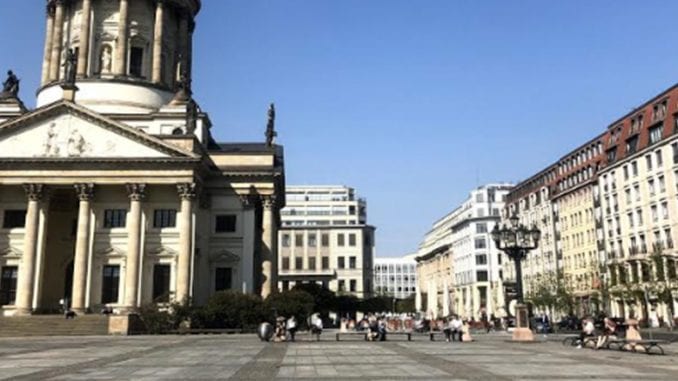
We learn how the owners of Germany’s Passenger Coffee and Happy Baristas got creative in finding ways to keep their customers caffeinated and their baristas paid during COVID-19 shutdowns.
BY CAROLINE CORMIER
BARISTA MAGAZINE ONLINE
Cover photo courtesy of Caroline Cormier
On March 18, Chancellor of Germany Angela Merkel delivered an unscheduled televised address that underlined the severity of COVID-19. “The situation is serious; take it seriously,” Merkel said, addressing the nation. “Since German unification—no, since the Second World War—there has been no challenge to our nation that has demanded such a degree of common and united action.” By then, Berlin had already officially entered lockdown mode: public gatherings of more than two people were forbidden, all schools and nonessential businesses were closed, and residents were urged to stay five feet away from one another.
In the weeks that followed, the usually vibrant and lively capital city became largely silent and empty. Traffic decreased by 54% and popup bike lanes appeared across the city as passenger volume on public transit decreased by 70%. More and more people began to work from home, grocery stores saw long lineups and empty shelves, and, for nearly six weeks, restaurants, bars, and, of course, cafés in the German capital remained closed.
In the months that followed, Germany’s coffee community quickly found creative ways to endure. Ranging from serving coffee out of their shop windows to providing delivery service or crowdsourcing the necessary funds to survive, coffee shop owners across the city of Berlin rose to the challenge.
PASSENGER COFFEE
In an effort to flatten the curve, the owners of Passenger Coffee began taking measures against COVID-19 in their Kreuzberg café on March 13. They had reduced their operating hours, served coffee to customers only in takeaway cups, and maintained that customers must enter one at a time. On their website and at their door, they advertised, “Surfaces and staff in the café will be regularly decontaminated. Loud and offensive music is played to prevent any desire for a long stay.”
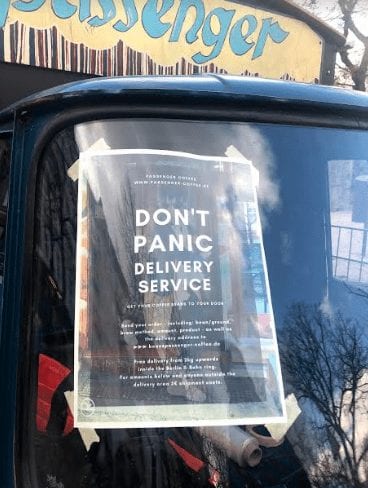
Even when all restaurants, bars, and cafés were forced to close entirely, the Passenger team found ways to survive. For example, Passenger began offering what they aptly called “Don’t Panic” delivery. Through this contactless delivery service, customers could send an email order—including bean/grind level, brew method, amount, and product—to the shop and receive free delivery from 2 kg upwards within the center of Berlin. A 5€ shipment fee could enlarge the delivery radius for those caffeine addicts living farther afoot.
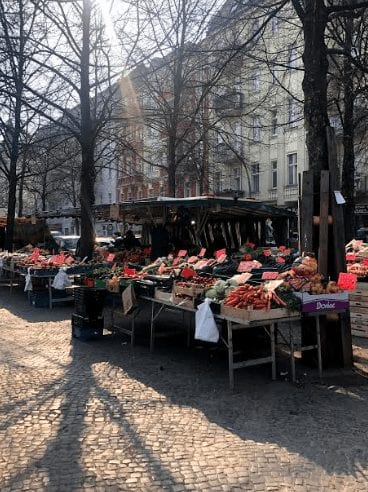
Luckily for Passenger, weekly farmers markets in Germany were deemed as an essential service in Berlin and, therefore, remained open. This meant that Passenger’s regular appearance at the bustling Boxhagener Platz farmers market remained possible during the entire lockdown period, even when they had to close the doors to both their Kreuzberg and Alt-Treptow locations. Week after week, loyal customers lined up to get their Saturday morning coffee, famously brewed from the back of a Piaggio Ape, often leaving the unique market stall with a 1 kg package of their favorite beans under their arm to fuel their newly instituted work-from-home lifestyle.
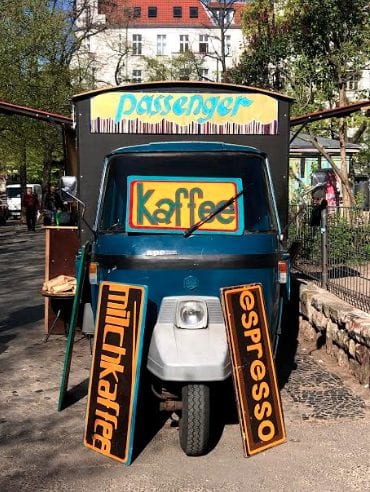
HAPPY BARISTAS
Another local favorite, Happy Baristas, first reduced their seating capacity and then, eventually, like all the other cafés in the city, closed their doors for nearly seven weeks. When they reopened again, they had reduced their operating hours and revised their menu to include new takeaway treats to be consumed either at home or at the park. They served their customers through the open window in an effort to continue to protect both customers and staff from transmitting COVID-19.
From the earliest days of coronavirus restrictions, co-owner Marian Plajdicko kept regulars up to date about the latest changes at the café through Instagram and Facebook. From the new menus to their reduced opening hours and new hygiene measures, Happy Baristas’ activities were noted on Instagram so the shop’s community could follow along with the ever-growing list of changes taking effect. It also was a place for further engagement. For example, Marian and his team created a Coffee in Cocktails series on Instagram, inviting people to use their time at home to not only support local businesses, but also to try their hand at something new.
On May 6, Marian, along with cofounder, Roland Lodr, announced that they had organized a Startnext campaign and asked for their community to support them during these difficult times. “This October,” Marian explains in the introduction, “we will celebrate our fifth anniversary. We had many ideas and plans for 2020, but corona had other things in mind. We’d like to continue to serve our guests with good morning coffee, provide daily lunch, and say goodbye to evenings with boozy coffee cocktails. Help us to cover the monthly costs so we can continue to put a smile on your face!” Elsewhere, Marian explained the situation further: “For many, like us, the next two months might be existential. Our rent goes up by a whopping 900 euros from July and our landlord doesn’t seem to be interested in any discussion so far. We have a team of nine employees whose wages and insurances must be paid by us monthly, without having any income for almost two months.”
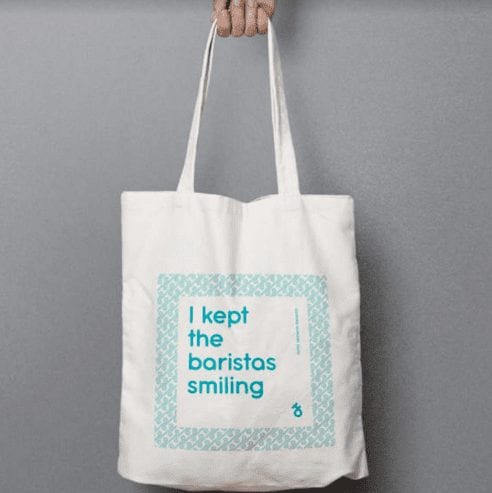
The so-called “Dankeschöns” for donating included future coffee cocktails and brunch for two, as well as branded tote bags and T-shirts with the motto “I kept the baristas smiling.” For the largest donation tier, a limited number of coffee cocktail workshops with Marian are being offered—a unique opportunity to work with a barista champion and competition judge to learn the tips and tricks behind Happy Barista’s delicious coffee cocktails. In addition to Happy Baristas’ fundraising efforts, the easing of restrictions in early May has brought many of the business’ regulars back to the shop for their caffeine fix. In fact, over the past several weeks, life—although now defined by a slate of new social distancing rules—has trickled back into the streets of Berlin. While there’s nothing normal about the current situation, it’s a relief to once again have the possibility to catch up with a friend (or even two) in the summer sunshine at these Berlin coffee hot spots—an experience that we all now know should not be taken for granted.
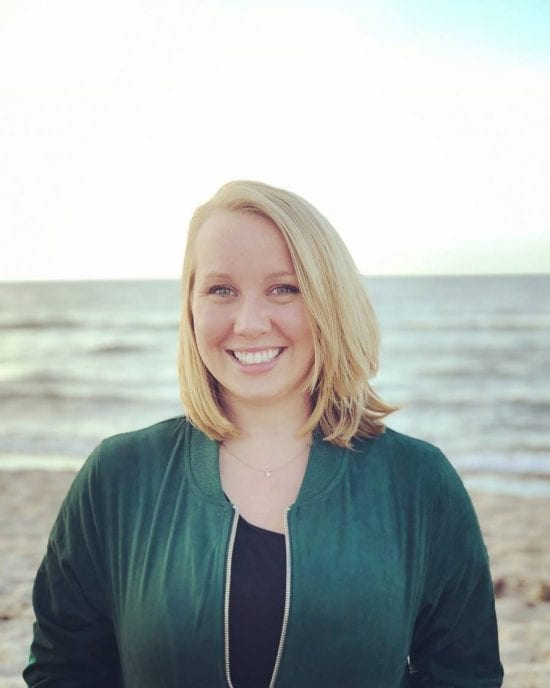
ABOUT THE AUTHOR
Caroline Cormier is a freelance writer from Canada. She currently lives in Berlin, where you can find her digging through archives to discover forgotten stories of the past for her Ph.D., exploring the city’s art and culture scene, or simply enjoying a good cup of coffee at a local café or farmers market.

